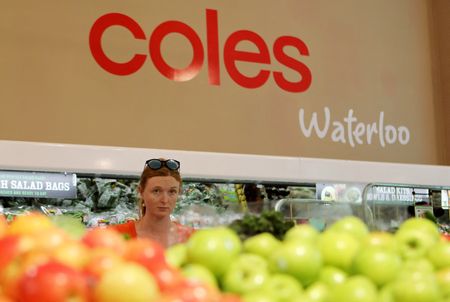 1
1 1
1

By Harish Sridharan
(Reuters) -Coles Group on Wednesday forecast higher costs for fiscal 2023, as inflationary pressures continue to impact its operations, sending shares of Australia’s second-largest grocer down more than 5%.
Retailers globally have warned that rising energy, fuel and ingredient costs will continue to reflect in higher price tags as they strive to protect their margins, even as shoppers switch to lower-priced goods amid a cost-of-living squeeze.
Shares fell as much as 5.2% to A$17.72, recording their biggest intraday percentage drop since Dec. 14, 2021.
The Melbourne-based retailer said capital expenditure is expected to be between A$1.2 billion ($829.32 million) and A$1.4 billion in fiscal 2023, compared with a net capex of A$1.14 billion this year.
The cost of doing business as a percentage of sales increased by 50 basis points to 21.4% in 2022 due to higher fuel costs and underlying cost inflation, Coles said.
“Consistent with our suppliers and customers, we are also seeing inflationary pressures impacting our own cost base with increasing wages, rent, fuel, supply chain and capital costs,” the company said in a statement.
Coles did not provide an update on its performance at the beginning of the new fiscal year while its commentary on outlook was slim.
“Given sensitivities around food inflation, management was always going to be guarded on the outlook,” Jefferies analysts said in a research note.
The over 100-year-old company said like-for-like sales for its supermarkets business rose 3.7% in the fourth quarter, while COVID-related costs in the same period also reduced to A$26 million.
It posted a profit of A$1.05 billion for the year ended June 30 and beat a Refinitiv Eikon estimate of A$987.67 million, boosted by online sales as people stocked up on essential items during extended lockdowns in the first half of the year.
Coles and bigger rival Woolworths, which collectively sell about two-thirds of Australian groceries, benefited initially from a rush of “pantry loading” as pandemic-related restrictions prompted people to spend more time at home.
Coles said it has increased the capital expenditure for its Witron and Ocado projects.
($1 = 1.4470 Australian dollars)
(Reporting by Harish Sridharan and Indranil Sarkar in Bengaluru; Editing by Vinay Dwivedi and Sherry Jacob-Phillips)